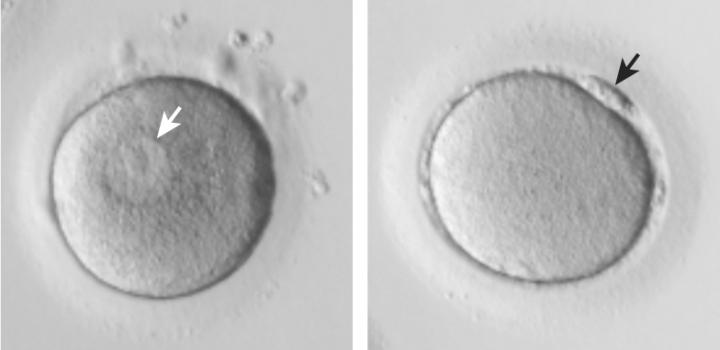Women’s fertility may decline with age due to impaired RNA levels

Credit: Montserrat Barragan/Clinica Eugin
Age may adversely affect women’s fertility by impairing levels of RNA molecules which in turn alter the function of genes involved in key biological pathways during the final maturation stage of a human egg cell, according to the findings of a new study published today in the journal Aging Cell.
Researchers from the Centre for Genomic Regulation (CRG), the Centro Nacional de Análisis Genómico (CNAG-CRG) and Clínica Eugin sequenced the RNA molecules, also known as the transcriptome, within oocytes to understand which genes are affected in their activity by age. They used single-cell sequencing to analyse the transcriptome of 72 individual oocytes from 37 donors between 18 and 43 years of age.
They found that the number of transcripts for genes involved in chromosome segregation and RNA processing increased progressively with age, while the number of transcripts related to mitochondrial metabolism decreased.
However, these age-related changes to the transcriptome only occurred when egg cells reached their final stage of development during in vitro maturation. The transcriptome was less affected by age in immature egg cells. According to the researchers, the findings suggest that age may influence an oocyte’s ability to process gene products critical for the last steps of their development.
Further analyses revealed a number of potential master regulator genes, which are genes that occupy the very top of a regulatory hierarchy, that are affected by age. Future work will test whether these genes play a critical role in oocyte aging.
“Here we show that the final step of oocyte maturation itself might be negatively affected by age, which is critical for reproduction because it provides the material early embryos need to develop normally and survive,” says Bernhard Payer, AXA Professor of Risk prediction in age-related diseases and Group Leader at the Centre for Genomic Regulation (CRG) and co-author of the study. “What we don’t know yet, is which of these changes are merely a consequence of the aging process and which may directly contribute to the quality drop in oocytes with age.”
The researchers also used donor height and weight information to assess the impact of body mass index (BMI) on the transcriptome. Unlike age, abnormal BMI mostly affected the transcriptome of immature oocytes. According to the authors, the finding suggests that the fertility decline caused by age might have different root mechanisms than the one caused by abnormal BMI.
Women’s fertility generally declines with age. One of the main reasons for this is due to depleted ovarian reserves, as baby girls are born with all the oocytes, from which mature eggs will develop, during their lifetime. Another reason is that the quality of eggs lowers with age, which is thought to be one of the main reasons for higher rates of infertility after the age of 35. Being overweight or underweight has also been associated with poor oocyte quality and reproductive outcome.
The authors conclude that though more studies are required, their findings may result in the future development of new diagnostic tools to better assess oocyte quality in reproductive medicine, as well as potential drug treatments that modulate the affected pathways to rejuvenate aged oocytes.
###
The study is a collaboration between three different research groups based in Barcelona; Dr. Bernhard Payer’s lab at the CRG, which is is the beneficiary of the AXA Research Fund support, Dr. Rita Vassena’s lab at Clinica Eugin and the Single-Cell Genomics team of Dr. Holger Heyn at the Centro Nacional de Análisis Genómico (CNAG-CRG).
Media Contact
Omar Jamshed
[email protected]
Related Journal Article
http://dx.




